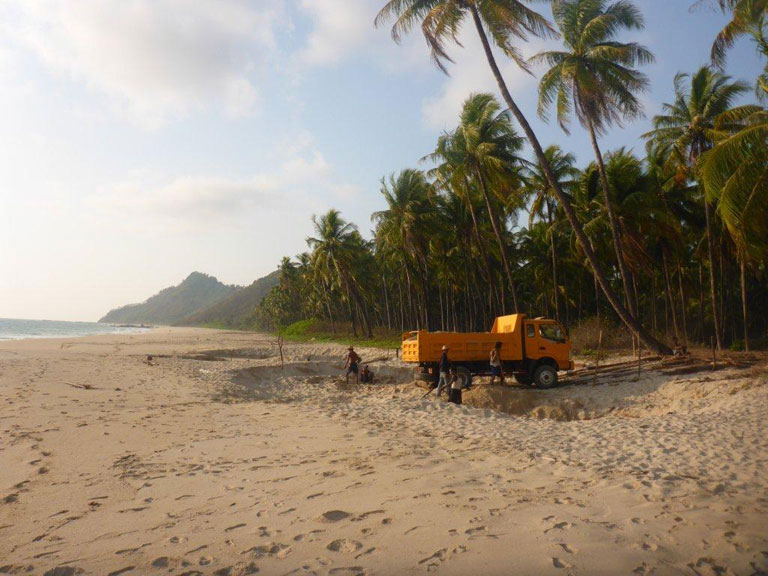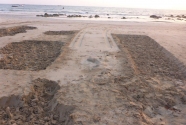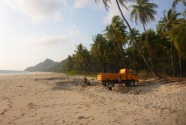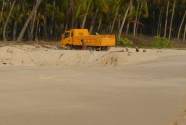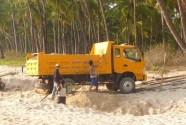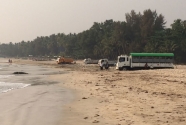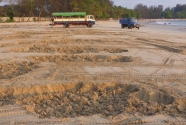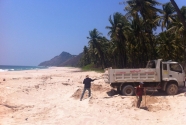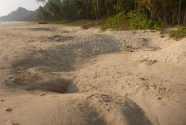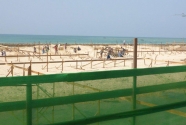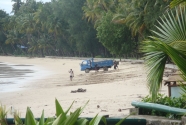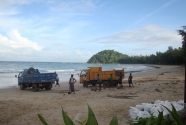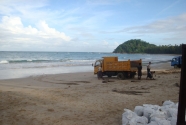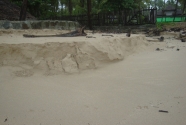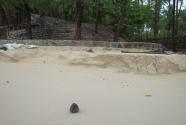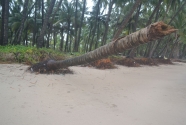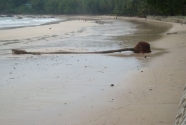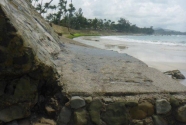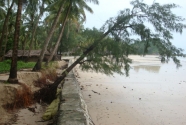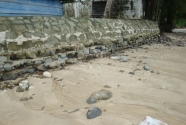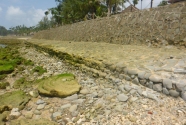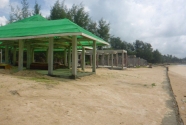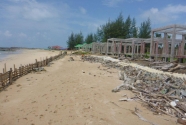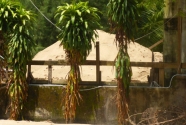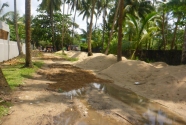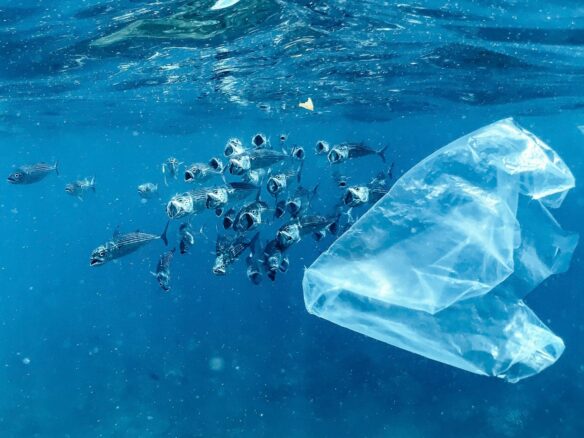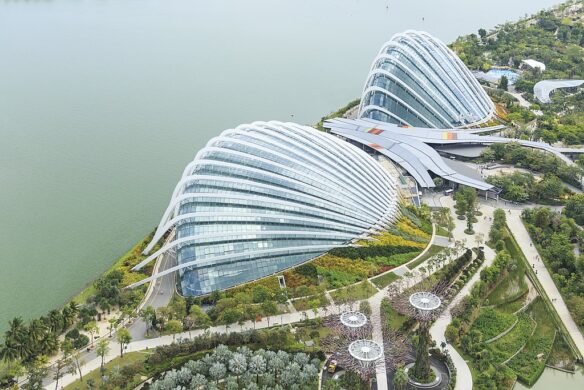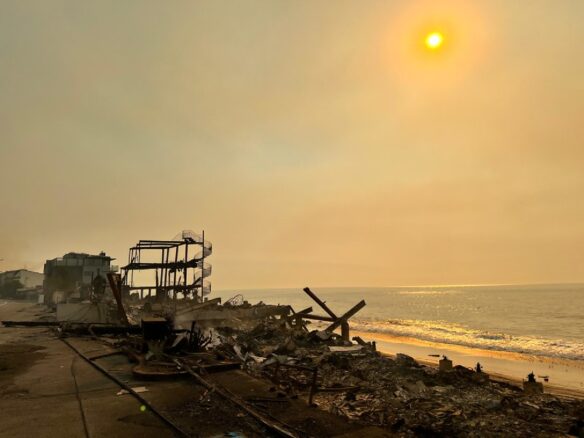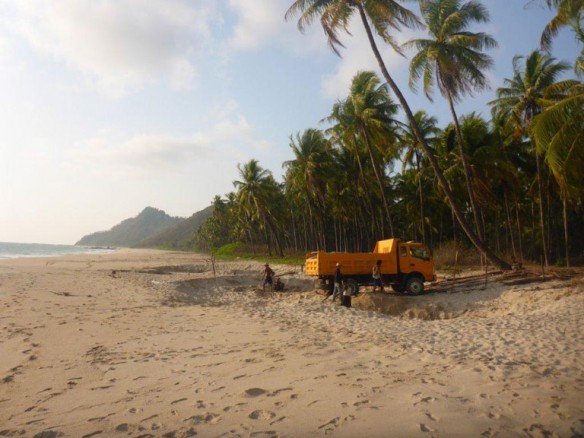
Ngapali Beach sand mining, Myanmar. Photo courtesy of: © Oliver E Soe Thet.
Excerpts;
Ngapali Beach continues to lose one of its greatest assets, despite beach sand being unsuitable for construction and regulations banning its removal.
Twenty years ago Ngapali Beach, on the Bay of Bengal in Rakhine State a short drive from Thandwe, was an unspoilt gem in the crown of Myanmar’s natural treasures. The local population, which had access to the beach, lived mainly from the sea.
Times have changed.
Nearly all the beachfront land has been sold and only a small strip of public beach remains. But the sand is disappearing.
Beach sand mining at Ngapali, has disturbed the natural balance…
Read Full Article, Frontier Myanmar (12-11-2015)
Ngapali beach sand mining:
A dossier and photo reportage, by Oliver Soe Thet
Photos taken in 2015, courtesy of: © Oliver Soe Thet. All rights reserved.
“Ngapali beach has been Myanmar (Burma’s) premier beach resort for over five decades and even before that was known to leisure visitors.
Alleged named because its sweeping bays reminded Italians of Napoli, its pristine white sands were enjoyed by the General Ne Win since the 1960s who is reported to have said that large scale development should be avoided and the natural beauty preserved for the local Rakhine people and the country. The government established a number of facilities in the area.
In the mid-1990s, many locals were pressed to sell their land on the area along the beachfront. From the late 90s, a number of local and foreign companies established hotels and developed the area for international tourists. Early foreign hotels such as Bayview introduced sustainability practices.
However from 2000 onwards, an increasing number of hotels were built, some by local companies. Bad practices developed unfortunately, such as the construction of reinforced concrete beach walls unsuitable for the strong monsoon which batters Ngapali from June-October. Such beach walls were assumed to be necessary and also were used as a means to encroach on the beach and block off areas to the public.
During this period, as in other beach locations in Myanmar such as Chaungtha and Ngwesaung, land was seized from local users for further hotels, and the airport beach area from Zibigine to Mazin was taken by the military with the exception of four acres. However hotel construction itself mostly stalled due to the poor economy and tourism boycott, and the lack of water and power. Companies were also uncertain of the legal title for the land they had acquired. During the 2000s, further beach wall construction and grabbing of the beach took place. In the latter half of the decade, further pressure was put on land owners to sell.
After the 2010 election, the opening up of the country led to further speculation, and the conversion of much nominally public land into private hands. Locals also believe that much forest and upland land has been acquired by Chinese investors, hindering their access for customary use.
The problem of beach sand mining, overseen and approved by the Thandwe district authorities, is an example of this conflict between the short term and personal interests and the long term interests of the community in maintaining Ngapali as a pristine beach location.
Currently in 2015, heavy trucks are entering the main tourist beach destinations day and night to dig pits in the sand. Ne Win’s vision of 5 decades ago will soon be a distant memory.”
Government, Hotels Pressure Local Officials Over Sand Mining, Myanmar Times News (05-14-2015)
The government, hoteliers and civil society are stepping up the pressure on Thandwe authorities to curb rampant sand mining at Myanmar’s premier beach destination, Ngapali…
Fears for Future of Ngapali Beach as Authorities Permit Sand Excavation; Myanmar, Myanmar Times News (03-15-2015)
Hoteliers at Ngapali in southern Rakhine State have warned that beaches in the area could be irrevocably damaged unless the authorities stop allowing sand to be taken for construction projects. Local authorities have formally allowed construction firms to take sand from three beaches in apparent violation of the Ministry of Hotels and Tourism’s Directives for Coastal Beach Areas…
Myanmar Wakes Up to Climate Change, IPS News (05-06-2014)
Sand Wars, An Investigation Documentary, By Award-Winning Filmmaker Denis Delestrac (2013)
Sand Thieves Are Eroding World’s Beaches For Castles Of Cash, by Martine Valo, Le Monde (09-2013)
The pillaging of sand is a growing practice in the world. This is because it represents 80% of the composition of concrete that it is the object of such greed…
BE THE CHANGE:
PETITION: Save Myanmar’s beautiful beaches from Greed & Destruction, By The Beachfront Club

